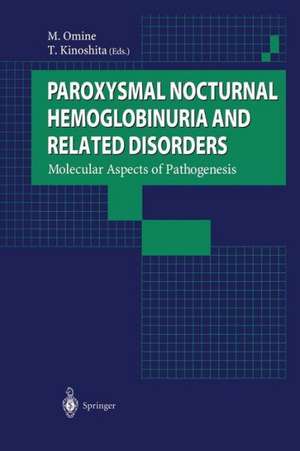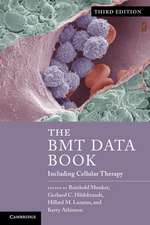Paroxysmal Nocturnal Hemoglobinuria and Related Disorders: Molecular Aspects of Pathogenesis
Editat de M. Omine, T. Kinoshitaen Limba Engleză Paperback – 11 oct 2012
| Toate formatele și edițiile | Preț | Express |
|---|---|---|
| Paperback (1) | 716.09 lei 6-8 săpt. | |
| Springer – 11 oct 2012 | 716.09 lei 6-8 săpt. | |
| Hardback (1) | 723.42 lei 6-8 săpt. | |
| Springer – 8 dec 2002 | 723.42 lei 6-8 săpt. |
Preț: 716.09 lei
Preț vechi: 753.77 lei
-5% Nou
Puncte Express: 1074
Preț estimativ în valută:
137.02€ • 143.45$ • 113.38£
137.02€ • 143.45$ • 113.38£
Carte tipărită la comandă
Livrare economică 05-19 aprilie
Preluare comenzi: 021 569.72.76
Specificații
ISBN-13: 9784431680048
ISBN-10: 4431680047
Pagini: 304
Ilustrații: XVIII, 285 p.
Dimensiuni: 155 x 235 x 16 mm
Greutate: 0.43 kg
Ediția:Softcover reprint of the original 1st ed. 2003
Editura: Springer
Colecția Springer
Locul publicării:Tokyo, Japan
ISBN-10: 4431680047
Pagini: 304
Ilustrații: XVIII, 285 p.
Dimensiuni: 155 x 235 x 16 mm
Greutate: 0.43 kg
Ediția:Softcover reprint of the original 1st ed. 2003
Editura: Springer
Colecția Springer
Locul publicării:Tokyo, Japan
Public țintă
ResearchDescriere
Few publications focus on the mysterious, genetically acquired disease paroxysmal nocturnal hemoglobinuria (PNH) and the related "intractable" disorders—aplastic anemia and myelodysplastic syndromes. Now, however, the latest understanding of the clinical and molecular genetic aspects of PNH is summarized here in the proceedings of the International Symposium held in Tokyo in 2001. Major topics reviewed include the molecular mechanisms of the PIG-A gene mutation; complement activation and inhibitors; experimental animal models; pathogenesis; the history of PNH research; the natural history of the disease; the mechanism of PNH clone expansion; the emergence of PNH clones under bone marrow failure syndromes; and treatment of the disease by immunosuppressive agents and stem cell transplantation. This book provides an invaluable summary of current research on the fundamental aspects of PNH pathology, presented by renowned experts in the field.
Cuprins
1: Overview of Paroxysmal Nocturnal Hemoglobinuria.- Overview of Paroxysmal Nocturnal Hemoglobinuria: Molecular Genetics.- An Overview of the Development of Specific Inhibitors of Complement: Opportunities for Therapy of Paroxysmal Nocturnal Hemoglobinuria.- 2: Pathogenesis and Animal Models of PNH.- Mice with Blood Cells Deficient in GPI-linked Proteins — The Generation of a Murine Model to Investigate the Pathogenesis and Pathophysiology of Paroxysmal Nocturnal Hemoglobinuria (PNH).- A Multistep Model for the Pathogenesis and Evolution of PNH.- Proposals for Classification of the Clinical Stages, Grading of Severity and the Molecular Pathogenesis of Paroxysmal Nocturnal Hemoglobinuria.- 3: Clinical Pathology and Natural History of PNH.- A Short History of Paroxysmal Nocturnal Hemoglobinuria: How We Came To Understand Its Natural History.- Clinical Pathology and Natural History of PNH; The French Society of Hematology Experience.- 4: Mechanism of Clonal Expansion in PNH.- PNH Clone Acquires both a Survival and a Growth Advantage?.- The Role of Lymphoid Cells in the Pathogenesis of PNH.- A Possible Intrinsic Mechanism for Clonal Expansion of PNH Abnormal Cells.- 5: PNH Clones Under Bone Marrow Failure.- Clinical Significance of Increased PNH-Type Cells in the Peripheral Blood of Patients with Aplastic Anemia and Refractory Anemia.- Incidence and Clinical Significance of PNH Clone in Myelodysplastic Syndromes.- The Enigma of the Aplastic Anemia/PNH Syndrome.- 6: PNH, Aplastic Anemia, Myelodysplastic Syndromes (1): Pathology.- Does PNH Ever Arise De Novo?.- Telomeres in Myelodysplastic Syndrome and Its Related Disorders: Does Telomere Length Reflect Stem Cell Turnover in Clonal Hematopoietic Disorders?.- Immunosuppression in Aplastic Anemia.- 7: PNH, Aplastic Anemia, Myelodysplastic Syndromes (2): Clinical Aspects.- Myelodysplastic Syndrome, Acute Leukemia and PNH After Immunosuppressive Therapy for Severe Aplastic Anemia.- Hemopoietic Stem Cell Transplantation (HSCT) for Paroxysmal Nocturnal Hemoglobinuria (PNH) and Acquired Severe Aplastic Anemia (SAA): A Report from the SAA Working Party of the European Blood and Marrow Transplant Group (EBMT).- 8: Related Topics.- Mutation Analysis of PIG-A Gene in Korean Patients with Paroxysmal Nocturnal Hemoglobinuria.- Two Possible Mechanisms for Escape of GPI Cells from the Immunological Attack.- Nature of PNH Clones in Aplastic Anemia.- Serial Analysis of Clonal Expansion in PNH by Flow Cytometry.- The Clinical Course of PNH in the USA and in Japan.- Long-Term Support of Human Hematopoiesis by a Single Stem Cell Clone.- Inflammatory Defects Caused by GPI-Anchor Deficiency in Macrophages.- Paroxysmal Nocturnal Hemoglobinuria in Association with Chronic Myelofibrosis.- Glycosyl-Phosphatidyl-Inositol Anchored Protein-Deficient Blood Cells in Children with Aplastic Anemia.- Helper T Cell Subsets and Th 1/2 Balance in Aplastic Anemia.- Relationship Between Immunologic Abnormalities and Paroxysmal Nocturnal Hemoglobinuria-Associated Clones in Myelodysplastic Syndromes.- Repeated Response to Antithymocyte Globulin in a Case of Aplastic Anemia-Paroxysmal Nocturnal Hemoglobinuria Syndrome.- Treatment of PNH Hemolytic Crisis with Heparin or Low-Molecular Weight Heparin by Its Dual (Anti-Complement and Anti-Coagulant) Activity.- A Patient with Paroxysmal Nocturnal Hemoglobinuria in Whom G-CSF Administration Was Remarkably Effective Against Recurrent Gastrointestinal Infections and Hemolytic Episodes Caused by Cellular Immunodeficiency.- Key Word Index.
Caracteristici
Provides an invaluable summary of current research on the fundamental aspects of PNH pathology, presented by renowned experts in the field






